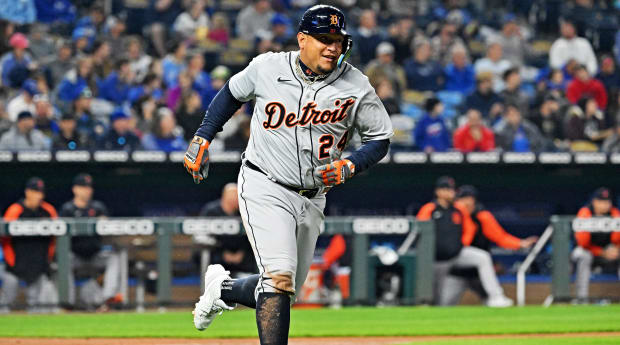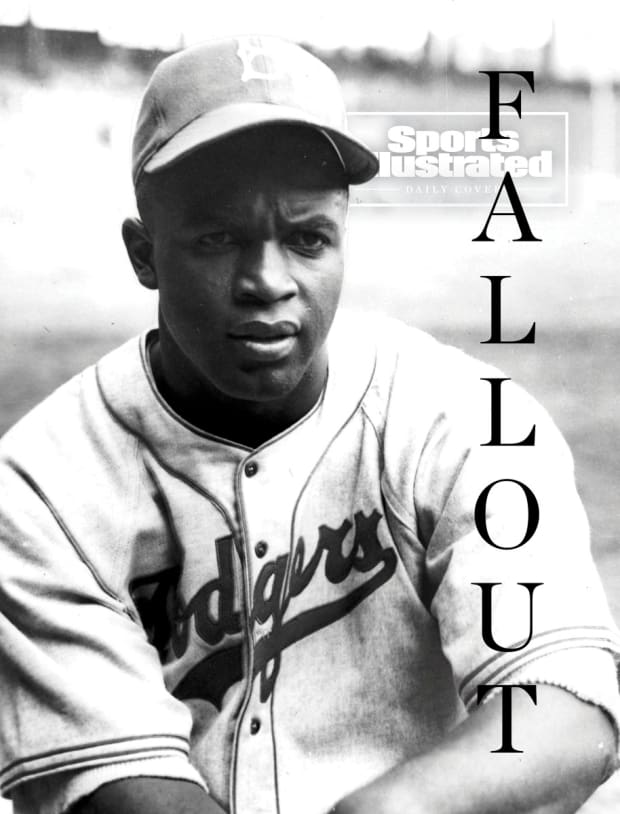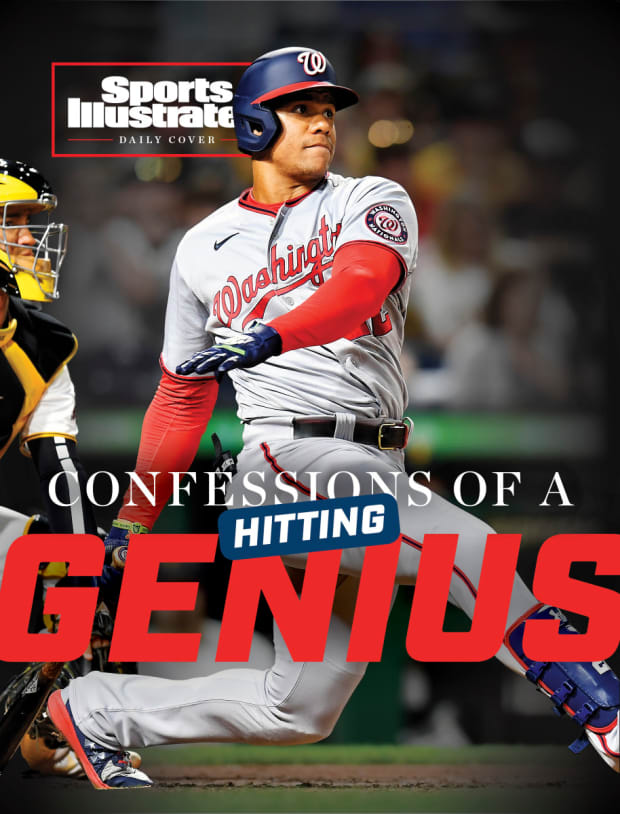After last night’s three-hit game, Miguel Cabrera is just six hits away from 3,000 for his career. He could get there as soon as this weekend’s series in Kansas City. If not, it would likely come some time next week when the Tigers return home to play three games vs. the Yankees and three against the Rockies.
Whenever and wherever his milestone knock comes, though, it will surely be cause for celebration of the moment and commemoration of one of the game’s all-time greats. Cabrera also enters Friday with 598 career doubles and he could reach the 600 milestone any day now, too.

Peter Aiken/USA TODAY Sports
Cabrera is no longer the dangerous hitter he was for nearly 15 years. Injuries and age—he turns 39 on Monday, an off day for Detroit—have sapped much of his power. But that doesn’t mean he’s completely washed up.
In a Tigers lineup that features some young, promising hitters (Spencer Torkelson, Akil Baddoo) and All-Stars in their prime years (Javier Báez, Austin Meadows), Miggy doesn’t have to be the best of the bunch for Detroit to be competitive. He just has to put together good plate appearances, pepper the field with singles and take advantage of mistake pitches for occasional extra-base hits. And he’s settled into that role nicely.
Cabrera has played 100 games since June 1 of last year. In that span, he is 103-for-358 with 16 doubles, 11 home runs and a .288/.338/.425 slash line. Those numbers aren’t what we remember from Miggy, but they aren’t bad, either.
All of this bodes well for Miggy, the Tigers and us baseball fans. For a bit, it looked like we were heading for an unceremonious, awkward conclusion to Cabrera’s career with Detroit, if not in MLB entirely. We saw the Angels release Albert Pujols last May before he could finish out the megadeal he signed with them. Cabrera and Pujols had similar offensive profiles during their primes, and watching them in recent years, it looked like they were aging similarly, too.
Pujols has since found a home as a part-time player, last year with the Dodgers and now with the Cardinals for his final season, and he’s taken to it well. He’s chasing milestones (20 home runs away from 700) but not hurting the team or embarrassing himself in the process. A similar final act for Miggy—without getting cut—is certainly possible.
The only other big milestone he could reach after he gets to 3,000 hits and 600 doubles is 2,000 RBIs, though that’ll be tough. He enters Friday with 1,807.
Cabrera is under contract through the end of next season, with vesting options for 2024 and ’25. For those options to vest, he needs to finish top-10 in the MVP voting the year before. If not, the Tigers will be on the hook for an $8 million buyout, which is what will end up happening. Still, if he maintains his current level of production and wants to keep playing, he could sign on for a cheap one-year deal with Detroit or another club.
So, say he has two seasons left after this one. Let’s take a look at where Miggy might finish on the all-time leaderboards if he keeps up his full-season pace of production.
To get a rough idea of that production, I used Baseball Reference’s per 162 games tool for the numbers Miggy put up from 2019 through the first seven games of this year. Then, I converted those numbers based on what they would be if he averaged 120 games per year this season and in ‘23 and ‘24. That seems reasonable, considering he played 136 games in ‘19 and 130 games last year—the two most recent 162-game seasons.
Here are his projected career totals, along with what his all-time rank would be, if he plays through the 2024 season.

That’s pretty sweet, although it’s not all that revealing. After all, we already know Miggy is one of the best hitters ever, and he’ll be elected to the Hall of Fame in his first year of eligibility.
But whenever a once great player approaches a milestone, we get a chance to look back on his career. If remembering and contextualizing his career isn’t exactly enlightening, at least it’s fun.
Have any questions for our team? Send a note to mlb@si.com.

Mark Rucker/Transcendental Graphics/Getty Images
1. THE OPENER
“MLB’s integration 75 years ago decimated the Negro Leagues, leaving many Black players, coaches and executives with nowhere to go.”
That’s Andrea Williams, who wrote today’s Daily Cover piece about the part of the Jackie Robinson story MLB wants to forget. As she so brilliantly writes, “75 years to the day after he first took the field at Ebbets, as Major League Baseball celebrates Jackie Robinson Day, with players wearing his No. 42 and the league offering its obligatory thanks to his courage, Black people in that very baseball league still don’t have it made.”
You can read Andrea’s entire story below:
The True Legacy of Jackie Robinson’s Debut Is Complicated by Andrea Williams
Also, I’d encourage you to read this piece from former SI senior editor Kostya Kennedy, about the impact Jackie Robinson had after his baseball career ended. It’s an excerpt from Kostya’s new book, TRUE: The Four Seasons of Jackie Robinson.
The Long Autumn of Jackie Robinson by Kostya Kennedy
2. ICYMI
Tom Verducci’s profile of Juan Soto is one of the best things I’ve read all week. It’s a fascinating look at MLB’s best hitter and what makes him so good.

Joe Sargent/MLB Photos/Getty Images
Confessions of a Hitting Genius: The Legend of Juan Soto by Tom Verducci
The Nationals right fielder is the greatest hitting prodigy since Ted Williams. He conquers baseball’s top pitchers by seeing the game on a higher level.
Tom also detailed all of the ways baseball is going to change—from rule changes to streaming and gambling—over the next five years.
MLB’s Modernization Is Underway, With More Radical Changes to Come by Tom Verducci
In need of some buzz, baseball will look vastly different over the next five years. Its future depends on it.
The breakdown in contract negotiations between Aaron Judge and the Yankees was one of the biggest story lines of the first week of the regular season. Tom wrote about why the superstar decided to turn down their offer to extend him for seven years at an average annual salary of $30.5 million.
The Yankees Can’t Replace Aaron Judge. That’s Why He Rejected Them by Tom Verducci
He’s an enormous asset to New York: a home-grown slugger with a marketable brand all his own. This is the only time in his playing career that he will have this kind of earning power.
O.K., that’s enough of Tom—until the next section. Here are some of the other great SI baseball stories from the past week.
Pulling Clayton Kershaw From the Perfect Game Made Too Much Sense by Emma Baccellieri
Manager Dave Roberts made the logical, unpopular decision to take out the ace during a perfect game and robbed us all of a great communal gift as much as a great individual achievement.
Braves Are Prioritizing a Decade of Dominance Over a World Series Repeat by Will Laws
Atlanta is set up to bring home more championships in the 2020s than the club did during its storied ’90s run—even if this year’s team isn’t primed to win it all.
Guardians Rookie Steven Kwan Is the Breakout Star So Far in 2022 by Nick Selbe
His success is historic and unsustainable, but his future looks bright nonetheless.
3. WORTH NOTING from Tom Verducci
The Yankees just might have added a new front-end starter—and it’s a familiar face. Luis Severino is back.
In his first start this season, after years of arm injuries, Severino hit 100 mph for the first time since June 2018. In his second start, Thursday against Toronto, Severino threw five shutout innings with a pitching clinic of changing speeds and making quality pitches when he needed them.
Severino threw 25 changeups—only once in his career has he thrown more in a game. And the Blue Jays went 0-for-5 against them. Most impressively, Severino became the first pitcher to strike out Vladimir Guerrero Jr. three times in one game. He did so by getting him twice on changes and once on a cutter.
The true test for Severino comes with the length of the season. He threw just 18 innings in the previous three years. But it is obvious that his pure stuff is back.
4. TRIVIA! from Matt Martell
Remember last week, when I said we wouldn’t have a weekly trivia question during the regular season, even though I would bring it back from time to time? Well, I’m bringing it back this week!
Why? One, because I felt like it. And two, because it ties in nicely with our Miguel Cabrera introduction topic. First, let’s answer last week’s.
Last Week’s Question: The Mets improved to 40–21 on Opening Day. Their .656 Opening Day winning percentage ranks first in MLB. Which team has the second-highest Opening Day winning percentage?
Answer: The Mariners (.617)
This Week’s Question: Miguel Cabrera is about to become the seventh player in MLB history with at least 3,000 hits and 500 home runs. Can you name the other six?
5. MAILBAG! from Emma Baccellieri
Welcome back to another mailbag. (Our first of the regular season!) Have questions for a future edition? mlb@si.com or @emmabaccellieri.
The Angels’ starting pitching actually looks pretty good to start the season. How long until it collapses into a tire fire? — Kenny
I am sure this will come back to bite me in, say, August, when the Angels’ pitching is mired in its usual, dream-crushing struggles, but I see decent reason for optimism here! Shohei Ohtani is Shohei Ohtani. It is not so hard to imagine a solid performance from Noah Syndergaard, even if it doesn’t quite reach the heights of what he did at full health at the beginning of his career. As far as reliever-to-starter conversions go, Michael Lorenzen is one of the best candidates you could hope for, given how deep his arsenal is (five pitches!). And then if you’re hoping only for collective decency, rather than greatness, from the development of José Suarez, Patrick Sandoval and Reid Detmers … that doesn’t seem unreasonable. If one of them breaks out, great, but even without banking on that outcome, you’re in a perfectly O.K. position. Is that rotation going to dominate? No, but it could easily be a strength(-ish) rather than a weakness.
Or it could be an injury-plagued mess again. Because, you know, it’s the Angels.
Why won’t people get on board with the ghost runner?
It’s been in softball (successfully) for years.
It instantly makes extras more exciting.
It’s not hard to move the runner over (sac bunt and you have a guy at third, then all you need to do is put the ball in play, really) (side note: why aren’t all MLB teams doing this!) And as much as people think they want extra innings *for the preservation of the sanctity of the game,* nobody actually likes the 16th inning on July 28th at 11:35 at night when teams trade 0-run innings.
I don’t understand the hate and vitriol, I truly don’t. — Holly
This is one I’ve changed my tune on! I originally was not a huge fan—mostly just because I wasn’t sure if baseball actually needed to make any changes here. A few seasons later … it wasn’t hard to get used to, it’s not that disruptive, the strategy can be fun, and I just feel baseball has more important things to worry about. But I think part of the reason there’s been so much pushback is simply because that’s what baseball fans do. (This is, after all, a game where you can still find those who consider the designated hitter an abomination. Hi, Tom.) I get the arguments about how there’s nothing exciting about a runner in scoring position when he’s just magically placed there; I get those about how extra innings are a delight not to be messed with. (I know, because I used to make some of those arguments!) But after having some time to adjust to how it looks in practice, I think it’s fine. And maybe in half a century, when everyone has finally come around to the universal DH, we’ll be starting to move on from this one, too.
What noodle has the best PAR (pasta above replacement)? — Rangers beat writer, and friend of the newsletter, Evan Grant
Ending with an important one here. It’s cavatappi—a true five-tool pasta, with the ideal size, whimsical curves, strong range, grooves to hold sauce and a great name (a great name is very important). If anyone tries to tell you “cavatappi” means corkscrew, it actually means “Mike Trout of pasta.”







